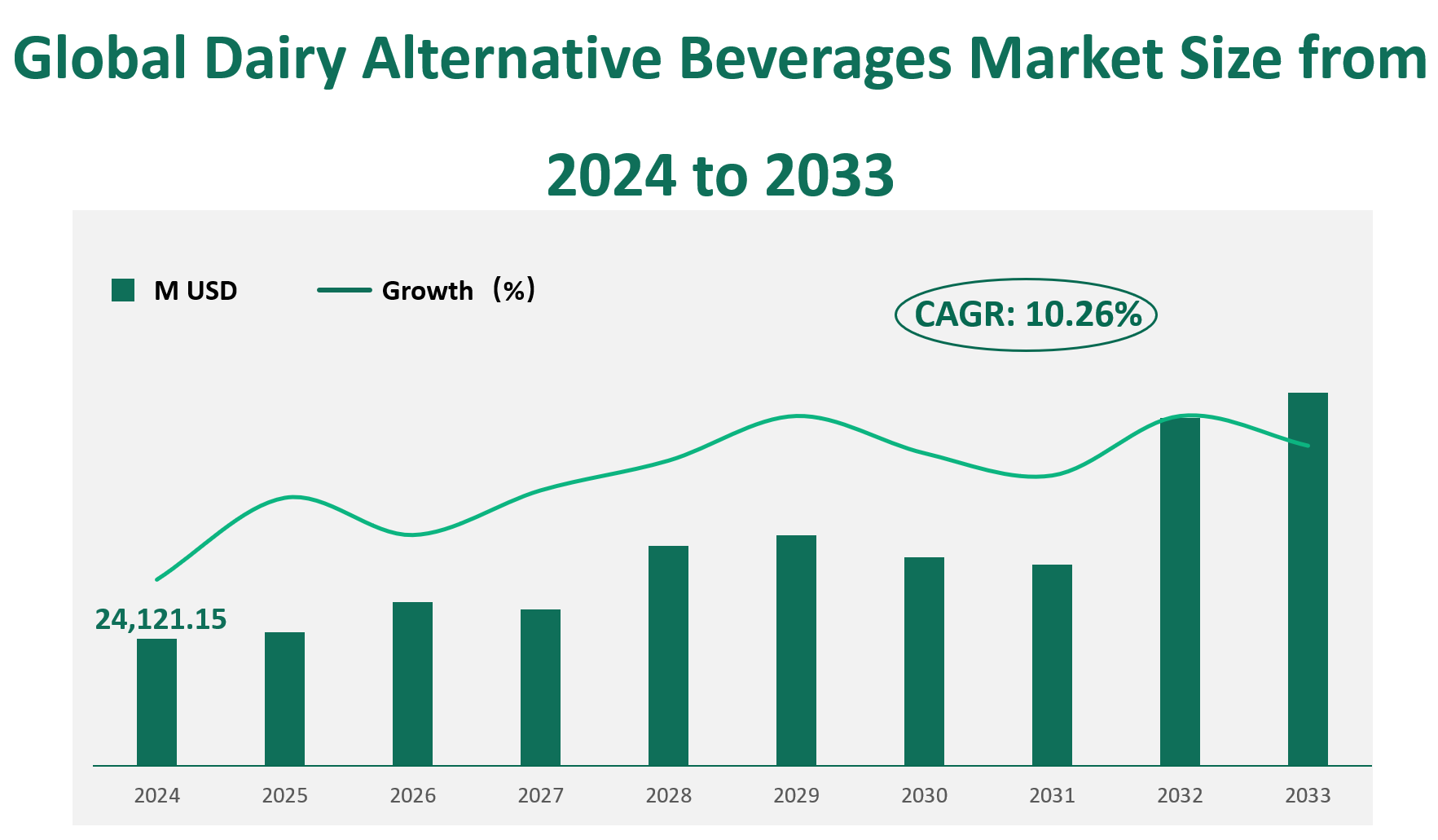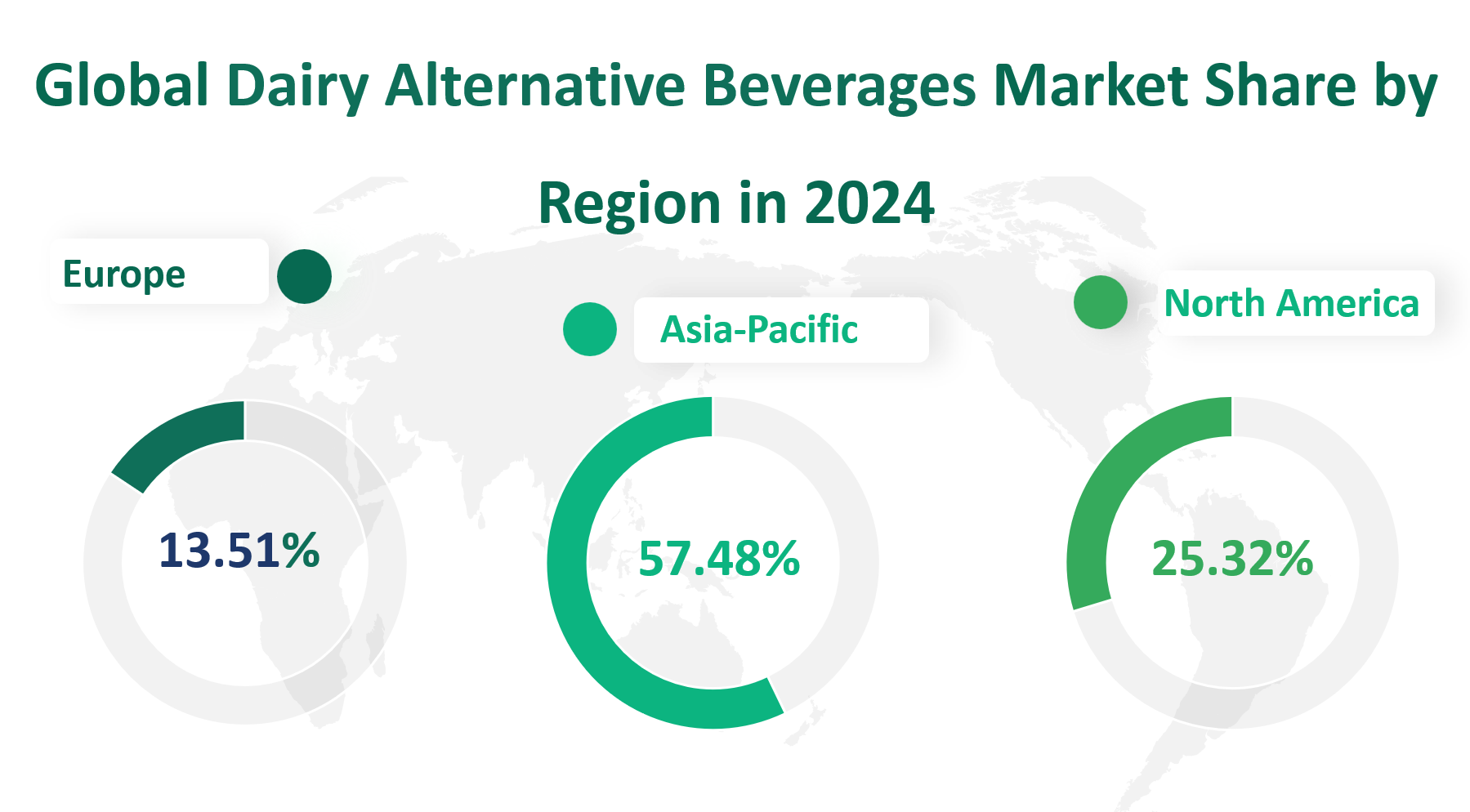1. Global Dairy Alternative Beverages Market Insight Analysis
The global Dairy Alternative Beverages market is projected to reach a value of $24,121.15 million (M USD) in 2024, with a Compound Annual Growth Rate (CAGR) of 10.26% for the next few years.
Dairy Alternative Beverages are plant-based milk substitutes derived from nuts, grains, and seeds. These beverages have gained popularity as alternatives to traditional dairy milk, particularly among vegans, lactose-intolerant individuals, and those with milk allergies. The primary types of Dairy Alternative Beverages include almond, soy, oat, walnut, and coconut-based products. These beverages are known for their low cholesterol levels and are often fortified with vitamins and minerals to enhance their nutritional value. They are widely available in hypermarkets, supermarkets, independent retailers, and convenience stores, catering to
Figure Global Dairy Alternative Beverages Market Size (M USD) and CAGR (2024-2033)

2. Driving and Limiting Factors of Dairy Alternative Beverages Market Growth
The growth of the Dairy Alternative Beverages market is influenced by several key factors. On the positive side, consumer awareness of lactose intolerance and dairy allergies has significantly increased the demand for plant-based alternatives. The rise in veganism and vegetarianism has also played a crucial role, as these dietary lifestyles emphasize the consumption of plant-based products. Furthermore, the introduction of new flavors and innovative products, such as almond milk-based Mexican hot chocolate by Blue Diamond, has attracted a broader consumer base.
Economic factors also play a significant role. Positive economic prospects and increasing disposable incomes in major economies like the United States, China, and the United Kingdom have enhanced consumers’ purchasing power, making Dairy Alternative Beverages more accessible. Additionally, the rapid development of e-commerce has streamlined the distribution process, reducing costs and improving accessibility.
However, the market also faces several challenges. One of the primary limiting factors is the complexity of processing plant-based beverages. Unlike traditional dairy products, plant-based alternatives require specialized formulas and processing techniques to ensure nutritional value and taste. This complexity can increase production costs and pose challenges for smaller manufacturers. Additionally, the market faces intense competition, with numerous companies vying for market share. This competition necessitates continuous innovation and investment in marketing to maintain a competitive edge.
3. Technology Innovation in Dairy Alternative Beverages Market
One of the most notable technological advancements in the Dairy Alternative Beverages market is the diversification of plant sources. Traditionally, almond, soy, and coconut milk dominated the market, but recent innovations have introduced new bases such as oat, walnut, hemp, and even pea milk. These alternative bases offer unique nutritional profiles and flavors, catering to a broader range of consumer preferences and dietary needs.
Manufacturers are leveraging advanced flavoring techniques to create more appealing and diverse flavor profiles. For example, companies like Blue Diamond have introduced flavored almond milk variants such as Mexican Hot Chocolate, which combines traditional ingredients like cinnamon and allspice to create a unique taste experience. Similarly, Pureharvest’s NOM range features blends of nuts and grains to create creamy, organic non-dairy milks with distinct flavors like Lush Almond, Nut Bliss, Creamy Cashew, and Macadamia Dream.
Cold-pressed and high-pressure processing (HPP) technologies have become increasingly popular in the production of Dairy Alternative Beverages. These methods preserve the nutritional content and natural flavors of the ingredients while extending shelf life without the need for artificial preservatives. HPP, in particular, uses high pressure to kill bacteria and pathogens, ensuring product safety while maintaining the freshness and quality of the beverages.
The adoption of automated and intelligent production lines has significantly improved efficiency and quality control in the Dairy Alternative Beverages industry. These technologies reduce human error, increase production speed, and ensure consistent product quality. Automated systems also allow for real-time monitoring and adjustments, optimizing the production process and reducing waste.
4. Global Dairy Alternative Beverages Market Size by Type
Dairy Alternative Beverages come in various forms, each with unique characteristics and market appeal. The primary product types include almond, soy, oat, walnut, and coconut milk.
Almond milk is derived from almonds and water, offering a creamy texture and a mild, nutty flavor. It is low in calories and high in healthy fats, making it a popular choice among health-conscious consumers. Almond milk is also suitable for those with lactose intolerance or allergies to dairy products. In 2024, the market value for almond milk is projected to reach approximately $5721.26 million, holding a significant market share of around 23.72%.
Soy milk is made from soybeans and water, providing a rich source of plant-based protein. It is a popular alternative for those who are lactose intolerant or seeking a high-protein beverage. The market value for soy milk in 2024 is estimated to be around $7414.00 million, with a market share of about 30.74%. Soy milk’s high protein content and versatility make it a preferred choice for many consumers.
Oat milk is derived from oats and water, offering a creamy texture and a slightly sweet flavor. It is a good source of fiber and is suitable for those with lactose intolerance. The market value for oat milk in 2024 is projected to be around $2577.89 million, with a market share of approximately 10.69%.
Walnut milk is made from walnuts and water, providing a rich source of healthy fats and antioxidants. It has a creamy texture and a nutty flavor, making it a popular choice for those seeking a nutrient-dense beverage. The market value for walnut milk in 2024 is estimated to be around $4421.26 million, with a market share of about 18.52%. Walnut milk’s health benefits and unique flavor profile contribute to its growing market presence.
Coconut milk is derived from grated coconut and water, offering a creamy texture and a slightly sweet flavor. It is rich in medium-chain triglycerides (MCTs) and is suitable for those with lactose intolerance. The market value for coconut milk in 2024 is projected to be around $2197.18 million, with a market share of approximately 9.11%.
Table Global Dairy Alternative Beverages Market Size by Type in 2024
Market Size (M USD) 2024 | Market Share | |
Almond | 5721.26 | 23.72% |
Soy | 7414.00 | 30.74% |
Oat | 2577.89 | 10.69% |
Walnut | 4421.26 | 18.33% |
Coconut | 2197.18 | 9.11% |
Others | 1789.57 | 7.42% |
5. Global Dairy Alternative Beverages Market Size by Application
The Dairy Alternative Beverages market is also segmented based on different applications, including hypermarkets and supermarkets, independent retailers, and convenience stores.
Hypermarkets and supermarkets are large retail stores that offer a wide range of products, including Dairy Alternative Beverages. These stores attract a significant number of consumers due to their extensive product offerings and competitive pricing. The market value for Dairy Alternative Beverages in hypermarkets and supermarkets in 2024 is projected to be around $10177.55 million, with a market share of approximately 41.29%.
Independent retailers are small businesses that operate without the support of established brands. They offer a personalized shopping experience and often stock unique products. The market value for Dairy Alternative Beverages in independent retailers in 2024 is estimated to be around $3970.60 million, with a market share of about 16.46%. These retailers cater to niche markets and consumers seeking specialized products.
Convenience stores are small retail businesses that stock everyday items such as snacks, beverages, and groceries. They offer the convenience of quick access and a wide range of products. The market value for Dairy Alternative Beverages in convenience stores in 2024 is projected to be around $5337.41 million, with a market share of approximately 22.13%. The convenience and accessibility of these stores make them a popular choice for consumers seeking quick and easy purchases.
Table Global Dairy Alternative Beverages Market Size by Application in 2024
Application | Market Size (M USD) 2024 | Market Share |
Hypermarkets and Supermarkets | 10177.55 | 42.19% |
Independent Retailers | 3970.60 | 16.46% |
Convenience Stores | 5337.41 | 22.13% |
Others | 4635.60 | 19.22% |
6. Global Dairy Alternative Beverages Market by Top Regions
North America is a key player in the Dairy Alternative Beverages market, with a projected market value of $6,107.56 million (M USD) in 2024. The region’s strong market position is driven by increasing consumer awareness of health and sustainability, as well as the growing popularity of plant-based diets. The United States, in particular, has seen a surge in demand for almond, soy, and oat-based beverages, supported by robust e-commerce platforms and a diverse range of product offerings. Major companies like Danone and Blue Diamond Growers Inc. have a significant presence in this region, contributing to its market strength.
Europe is another major market, with an estimated value of $3,258.99 million (M USD) in 2024. The region’s market growth is fueled by a high level of consumer awareness regarding health and environmental issues, as well as strong regulatory support for sustainable products. European consumers are increasingly turning to plant-based alternatives, driven by the rise in veganism and lactose intolerance. Companies such as Danone and OATLY AB have been at the forefront of innovation, introducing new flavors and products to cater to the evolving consumer preferences.
The Asia Pacific region is projected to be the largest market by revenue in 2024, with a value of $13,865.66 million (M USD). This region’s dominance is attributed to its large population base, rapid urbanization, and growing middle class, which has led to increased disposable incomes and a shift towards healthier dietary choices.
South America’s Dairy Alternative Beverages market is expected to reach $591.99 million (M USD) in 2024. The region’s market growth is driven by increasing health consciousness and the availability of a wide range of plant-based products. Brazil is a key market, with a growing consumer base that prefers healthier and more sustainable options.
The Middle East and Africa region is projected to have a market value of $296.96 million (M USD) in 2024. While this region is smaller compared to others, it is experiencing steady growth driven by increasing health awareness and the availability of plant-based alternatives.
Figure Global Dairy Alternative Beverages Market Size by Region in 2024

7. Global Dairy Alternative Beverages Market Analysis by Major Players
7.1 Danone
Introduction and Business Overview: Danone is a leading multi-local food and beverage company with a strong focus on health and sustainability. Established in 1919, Danone operates globally and is known for its diverse product portfolio, which includes essential dairy and plant-based products, waters, and specialized nutrition.
Products Offered: Danone offers a wide range of Dairy Alternative Beverages, including almond, soy, and oat-based products. Their products are known for their high nutritional value and are often fortified with vitamins and minerals.
7.2 Vitasoy International Holdings Limited
Introduction and Business Overview: Vitasoy is a Hong Kong-based beverage company with a long history dating back to 1940. The company is known for its high-protein soy milk drinks and has expanded its product line to include a variety of plant-based beverages. Vitasoy operates primarily in the Asia Pacific region and has a strong market presence in China and other Southeast Asian countries.
Products Offered: Vitasoy offers a range of Dairy Alternative Beverages, including soy milk, almond milk, and oat milk. Their products are known for their high protein content and are often fortified with vitamins and minerals.
7.3 Blue Diamond Growers Inc.
Introduction and Business Overview: Blue Diamond Growers Inc. is the world’s largest almond processing and marketing company. Established in 1910, the company is headquartered in Sacramento, California, and is known for its high-quality almond-based products. Blue Diamond operates globally and has a strong presence in North America and Europe.
Products Offered: Blue Diamond offers a variety of almond-based Dairy Alternative Beverages, including almond milk and almond milk blends. Their products are known for their creamy texture and are often fortified with vitamins and minerals.

